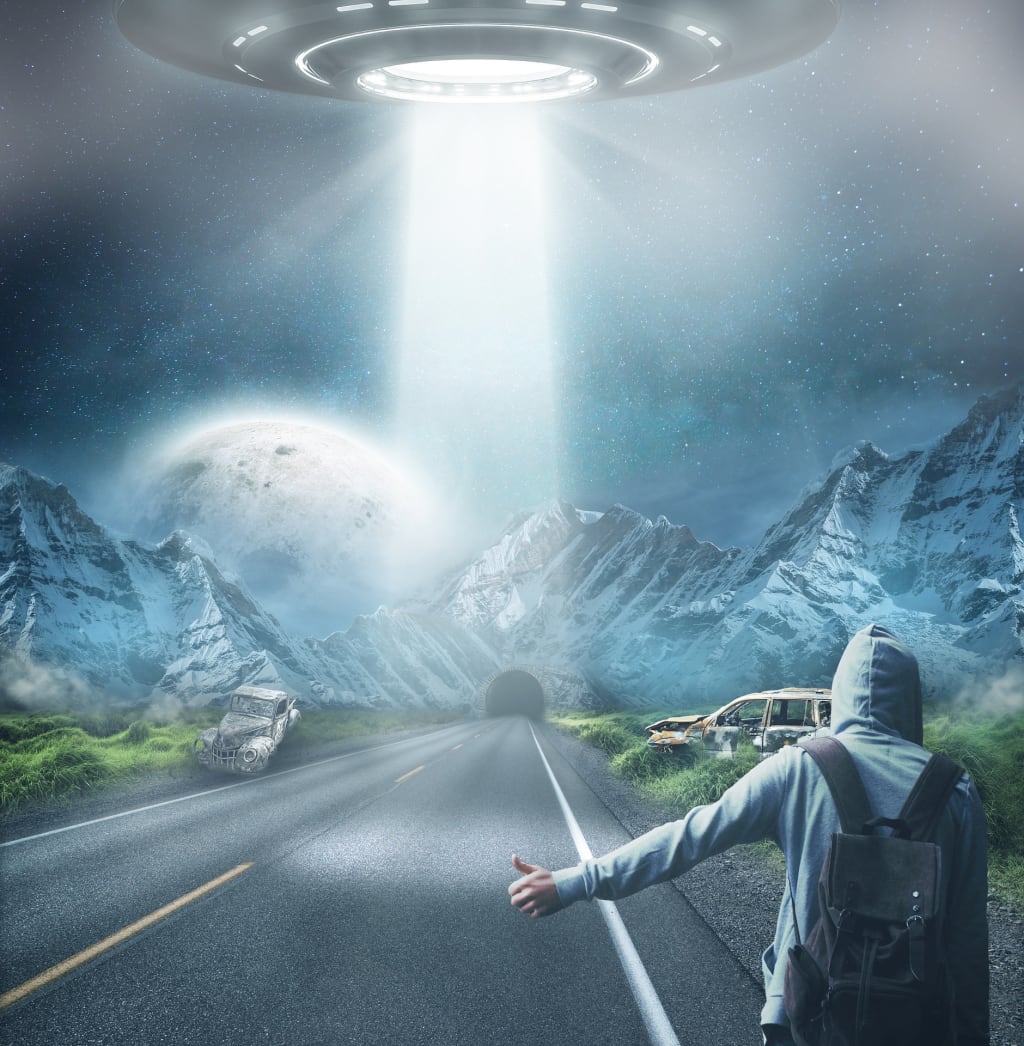
The UFO discourse, like any other field of study, has philosophical underpinnings that function like a spectrum. The opposite ends of the spectrum provide an overly simplistic idea of the ‘reality’ of the UFO question. If, for the sake of argument, we assume UFOs are intelligently controlled, we generate a cornucopia of theories and hypotheses that attempt to establish the source. On one side, we have a “nuts and bolts” hypothesis. On the other side of the spectrum, a theological/theosophical mysticism. I will expand upon both of these to provide a clear understanding of the two philosophical extremes of modern Ufology. That being said, these two poles are not necessarily an ‘either or’, but simply lay out the general boundaries of Ufological belief systems. I must first make one note...
UFO discourse is a broad category of various subjects. It constitutes strange anomalous lights in the sky, to landed unknown objects, to contact and abduction phenomena. It involves aspects of conspiracy, military and corporate coverups, reverse engineered technology, exopolitics, religious cults, and even a branch of philosophy called exophilosophy*.
*As I researched this term, I learned that it was actually decades (some would argue centuries) old. It has been used in novels, a university course, blogs, and even academic papers. I like to think of it as a ‘rogue’ branch of philosophy that explores ideas of extraterrestrial intelligence. It stems from human philosophies in an attempt to understand alien interactions with humankind. It isn’t the philosophy of aliens as such, rather, it explores ‘contact’ with humans. Terra Obscura is, in essence, an ‘exophilosphical’ blog. It uses human philosophy and critical theory to establish potential arguments/reasons/rationales for how and why intelligent Others would interact with humans.
While agents of UFO discourse do not necessarily support or buy into every aspect of the discourse, all of these constructs shape the discourse into what it is today. The discourse itself operates along one long spectrum constituting various ideologies. On one end, the hard ‘scientific’ nuts and bolts hypothesis; on the other, a hybrid spiritual mysticism of sorts. Many members fall somewhere between these two poles, however, due to the democratized nature of UFO discourse, offshoot spectrums have and will undoubtedly form.
Nuts and Bolts Ufology - A Scientific Approach to an Intelligent Other
On one end point of the spectrum dwells the belief in this simple hypothesis. The bulk of UFO sightings, contact and abduction phenomenon, as well as all other related events, are misidentified, delusions caused by an overactive imagination, or some other human error. However, a small number of UFO or related incidents are far too compelling to ignore, and carry with them a high level of strangeness, and remain classified as unknown objects. The hypothesis then posits that of this small number of UFO events, a few, a handful if you will, are potentially not of this world. Since these cases are of high quality, they potentially can be investigated scientifically. More importantly, the hypothesis posits that these UFOs are machines (or something akin to a machine), and their pilots are intelligent and come from somewhere else (be it time, space, dimensions, etc.) This side of the spectrum basically constitutes the famous ‘extraterrestrial hypothesis’ among others. The UFO pilots, whomever they are, are not mystical or magical (though their scientific knowledge may seem that way to us), but are physical and they use physical craft to travel.
The space (time, dimension, whatever) travelers enter our physical space. They interact with the physical world. They have sovereignty, like we do, to move about, make decisions, and engage with humans when they choose. There is no mysticism here; they are agents who possess a free will of sorts, and have mastered the sciences.
Universal Consciousness, Mysticism, and Spirituality - The Metaphysical Intelligent Other

On the opposite side of the discursive spectrum is the world of the mystic. All phenomena, normal and paranormal, UFOs and intelligent Others included, are all connected by a universal ebb and flow. Much like Samsara in Hinduism, the entire universe (this includes all possible universes, alternate dimensions, levels of reality, vibration states, basically, all of the things...and non-things too I suppose) are one. Consciousness is connected. Every single subatomic particle in every single universe makes up one grand tapestry, all interlocked and communicable. This hypothesis is a mashup of various eastern philosophies, indigenous belief systems, and theological concepts. All beings are one. It stands to reason, using this line of thinking, that certain beings who have achieved some higher insight or ability are then able to communicate and travel using this interconnected system. This accounts for all paranormal phenomena, channeling, abduction, contact, and all other UFO events. Intelligent Others use this interconnected system to somehow engage with humanity, be it spiritually and even physically.
While this hypothesis is beautiful, the burden of proof here is significant. It does require a theological leap of faith. One must believe in the universal consciousness/energy/whatever theory as it is (currently) unprovable. It also creates a few philosophical issues, the first of which is that individuality, and even free will itself, is called into question. If all consciousness is connected, and the self is part of a larger collective, what does that say about my freedom of will? Am I an individual? Are my choices truly my choices? It’s a philosophical can of worms that, once opened, calls into question the fundamental principles by which our human society currently functions. Maybe that is a good thing. Maybe not.
This ‘camp’ of UFO discourse relies on meditation, vibration level adjustments, and a shamanism for the postmodern era. It becomes difficult to weed out delusion, as all contact with the Others is personal and subjective. With enough mystical development, training, or meditation, any person is able to make contact. I would not go so far as to call it a religion, as there is no real governing body or system, rather, it is a smorgasbord of various teachings and philosophies where anything goes.
Two households, both alike in dignity.
Similar to a suspension bridge that hangs over a chasm, these two ideas root UFO discourse to the firm ground of other discourses, in essence, science or theology. The vast majority of us, those who participate in the discourse, stand somewhere on this bridge. Many stay close to one side of it, near the solid ground, and the anchors which hold the bridge in place. Many venture farther out, and attempt to find the middle, where they use a mixture of science and mysticism to find answers to the UFO question. Once in awhile, the wind blows, the bridge sways about wildly, and a few fall off to leave the Ufology debate. Sometimes people just jump right off. Most interestingly, people tend to move about the bridge. They try one side, and walk across to the other until they find their place. This analogy is purposeful. If UFO discourse shed one of the anchors, one of the ends of the spectrum, the bridge would collapse.
It is impossible to separate the more mystical contact and channeling phenomena from the scientific study of unknown lights and objects in the sky. While members of the discourse will often draw lines in the sand to differentiate their belief structures from that of others, such as the more science minded Ufologists versus the UFO believer cultists, they all play on the same beach. While some may intend to separate the UFO question from theories regarding extraterrestrials or universal consciousness, it is fundamentally impossible. Anomalous lights, which could be perfectly natural a la Hesselden, or classified military aircraft built on funds paid out of black budgets, go hand in hand with all other alien theories in UFO discourse. While the general sciences or military politics will answer some of the mysteries, the solving of those problems tends to lead towards more questions.
Philosophers have long debated where the ‘mind’ exists within the physical body. The non-physical concept of the self has yet to be linked to the physical part of the brain that allows me to raise my hand, make a cup of tea, or write a blog post. Neither philosophy nor science has come up with an answer that please everyone. Due to the very spooky and mysterious nature of the UFO phenomenon in general, the spectrum attempts to address all potential outcomes should an answer avail itself. Similar to the ‘mind-body problem’ in philosophy, there is no connection point between the UFO question and the UFO reality (whatever that may be). UFO sightings, close encounters, contact phenomena, abductions, and the rest coexist within the entirety of the UFO belief spectrum, aspects of science and mysticism that seem to intermingle. There is no proven concept or mechanism that establishes a reality to the UFO question; therefore the spectrum of belief, and the two extreme poles which make up the boundaries of that spectrum, are not only equally valid, but essential to the UFO debate. Does this necessarily mean there is no correct answer? No. Perhaps there is one causal link to secure the UFO question to a provable fact. However, much like the philosophical mind-body problem, the more science digs into the neurobiology of the brain, the more philosophical questions begin to emerge.
An Exophilosophical Conclusion?
The beauty of philosophy in general is that it is able to question both sides of the spectrum. There are clear issues with the ‘nuts and bolts’ scientific UFO question. A big issue is proof. UFOs are too pesky to study, as they generally do what they want. How does a scientific mind adapt to Ufological randomness? Has any scientific progress been made in proving the phenomenon? Has any survey or collection of UFO data actually brought us closer to understanding what is going on, or simply muddied the water more? Just because UFOs are machines controlled by alien scientists, does that erase the possibility of a universal consciousness? Can science extend understanding beyond technology and gadgetry into the realms of time and space, multiple dimensions, and states of consciousness? Can a species advance scientifically to a point where physical science is no longer necessary, where the understanding of space and time can shape physical reality? More importantly, there are significant ethical questions; is it permissible for an intelligent Other to monitor humanity without consent? Would this not be tantamount to ‘might makes right’?
The mystical camp also raises many questions. Is it possible to prove that universal consciousness, vibration states, and multiple dimensions actually exist? How can one differentiate between a ‘real’ encounter with an intelligent Other and one that is delusional, or an illusion generated by deeper mental health issues? This is essentially an open door policy to a subjective UFO discourse. No peer review. No judgements on validity. No rigour. How does one prove any of this to be true? What is the difference between this mysticism and the belief in God?
This begs an interesting question; are there Ufologists who do not believe in the hypotheses that reside within the spectrum? The entire spectrum as presented depends on an intelligent Other to be somehow responsible. What if the UFO reality is a psycho-social delusion? What if it is a modern cultural myth that resides within the human mind? Are the proponents of these theories Ufologists? Are they considered ‘members’ of the UFO discourse by the broader UFO community? Can a debunker be a Ufologist? Or is it mandatory for a Ufologist to have an open mind towards the possibility of an intelligent Other, be it scientific or mystical?
These are the questions that philosophy, or ‘exophilosophy’ (if I can use the term) must begin to raise not only with researchers, investigators, and members of the Ufological community, but with UFO discourse itself. What is Ufology’s ultimate purpose? Where is it headed, and will it make progress or continue to sputter? By clearly establishing the spectrum of Ufological belief, we understand the playing field. Who will play, and who will warm the bench? We just need to figure out what the game is…
About the Creator
MJ Banias
MJ is a writer and theorist who explores the modern UFO phenomenon, and other strange Fortean subjects. He has been featured on podcasts, writes for Mysterious Universe, and is also featured in the book 'UFOs: Reframing the Debate.'






Comments
There are no comments for this story
Be the first to respond and start the conversation.